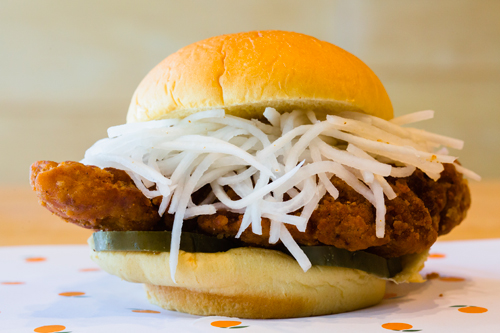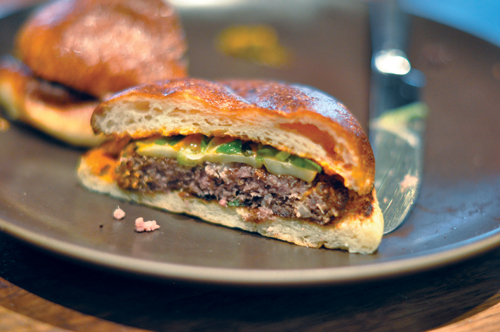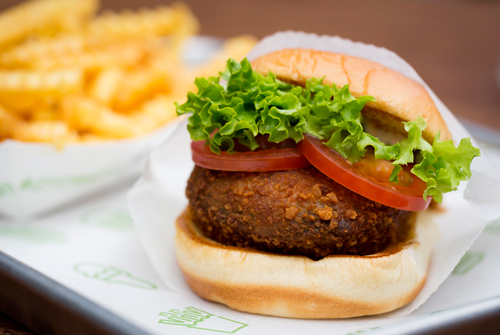From Michelin stars to burgers: why top US chefs are changing direction
Some of the biggest chefs in the US are turning to fast-casual concepts as a new outlet for their creativity, with brands like Shake Shack growing at phenomenal speed. Kerstin Kühn investigates the Michelin-starred cooks turning their attention to 10-dollar meals
This is about to change. Skenes has teamed up with renowned operator Adam Fleischman of the Umami Burger and 800 Degrees Pizzeria chains to launch a fast-casual concept called Fat Noodle, which is set to open its first unit in San Francisco in the next six months. Here, bowls of hand-pulled noodles inspired by the flavours of western China's Sichuan and Shaanxi provinces - created under the guidance of Skenes - will be available for less than $10 (£6.40) in a concept that the duo hopes to roll out across the USA and beyond. "My plan was always to do both a very high-end restaurant like Saison, and then also a very low-end restaurant," Skenes, one of just 11 three-star chefs in the US, explains. "While I appreciate the craft of cooking at the highest level, I also want to have accessibility and give people access to great food at a cheap price point."
Skenes is part of a tidal wave of top US chefs and restaurateurs flooding into the fast- casual market - the fastest growing segment of the US restaurant industry - including the likes of David Chang, Daniel Patterson and Roy Choi, and José Andrés (see panel). But what makes the fast-casual sector so appealing to these fine-dining chefs? According to Darren Tristano, executive vice-president at food service research and consulting firm Technomic, the key to its success is fast-casual's unique ability to combine the convenience of fast food with the quality of full-service restaurants. "The sector has focused on a more simple menu that provides food that is better than traditional fast food and on par with full-service casual-dining restaurants. The appeal is largely to the younger and more affluent consumer, who is willing to pay more for a quality product," he says. "High-end chefs know good food and affluent consumers, therefore, they are moving down to a more mainstream product with a consumer they are already familiar with, to create growth opportunities."
And competitive certainly is the word. Data from Technomic suggests that fast-casual restaurant growth is outpacing all other sectors in the US eating-out market, having jumped from $8b (£5.1b) in 2002 to $35b (£22.3b) in 2013. Current sales are up 11%, compared to 4% among quick-service restaurants and 5.6% in casual dining.
Given the success of the fast-casual movement, it's no surprise to see high-end chefs honing in on it; after all, it presents a great opportunity for the likes of Skenes to reach a larger audience.
"By nature of the business, the fast-casual model allows us to feed more people per day than we otherwise would do in a full-service restaurant," says Jim Biafore, director of operations at Beefsteak, a new fast-casual chain launched by celebrity chef José Andrés. "By the sheer numbers this does allow us to grow and build more locations, which allows us to reinvest our resources in our people."
Moreover, Tristano adds that fast-casual restaurants can be attractive for high-end chefs as they provide a more diversified approach to their restaurant portfolio. "Recently, the success of Shake Shack has proved that a great fast-casual concept from a major chef-restaurateur can be incredibly lucrative," he says.
Indeed, the two biggest inspirations for a lot of chefs entering the arena are celebrated New York restaurateur Danny Meyer's Shake Shack, which has grown from a hot dog stand to a global chain valued at more than $1b (£640m); and Mexican chain Chipotle which, started by erstwhile fine-dining chef Steve Ells, is now expanding at a rate of four new outlets a week.
"It comes down to the simple idea of guests wanting access to high-quality food at a great price," insists Randy Garutti, chief executive officer at Shake Shack. "Talented chefs are seeing this and acting on it. They're bringing their sought-after expertise and culinary craft to the table in new and creative ways."
A number of high-profile US chefs have made a successful move into fast-casual. They include Wolfgang Puck, whose chain Wolfgang Puck Express launched in 1991, way before the term fast-casual was even coined; Tom Colicchio of New York City's Craft, whose sandwich-focused ventre is in two states; and Bobby Flay, whose hamburger chain Bobby's Burger Palace has grown to 17 locations. But the landscape is about to get a lot more crowded, with many chefs debuting fast-casual concepts this year (see panel). They are elevating sandwiches, burgers, noodles, tacos and more, and are reimagining fast, healthy eating at a cost affordable to the masses.
"Taking a high-end offering at $50-$100 [£30-60] per person down to a $9-$12 [£6-8] format can be challenging," says Tristano. "These chefs need to create their food in a smaller environment with fewer ingredients, less equipment and with a team that is fully engaged with customers through interaction."
Meanwhile, Ethan Stowell - whose eponymous restaurant group in Seattle includes nine top-end restaurants, plus the fast- casual Ballard and Frelard Pizza Companies - says the key skill is for chefs to apply their knowledge of products and food to a different business model. "It's the same approach as making a foie gras terrine," he says. "You have to figure out a way to make it the best you possibly can. But the difference is that you can break away from it eventually. Fast-casual restaurants don't require you to be there all the time. People who come to my pizza restaurants don't expect to see me there and some of them don't even know who I am. It's a very different customer base."
This is echoed by Fleischman, who insists only certain types of fine-dining chefs can make the transition. "The concept has to be strong, and it cannot require a chef-driven presence," he warns. "The food is everything, and folks distrust big name chefs on low-end concepts."
Ultimately, it comes down to two key factors, says Stowell: "You have to have a strong team in place that allows you to break away. And you have to have a mind for business. If you are going to run two different concepts and apply the same principles of your business model onto both, there's a chance it might not work."
What is fast-casual?
In the US, fast-casual is led by brands such as Chipotle Mexican Grill, Panera Bread, Five Guys and Shake Shack. The fast-casual movement started in the 1990s, driven by increased consumer demand for both quality and convenience.
Positioned between fast food and casual dining, fast-casual restaurants typically offer counter rather than table service, but provide a sleeker interior and superior food offer to fast-food outlets, focused on higher quality, freshly prepared ingredients.
From Main Street to High Street
Where America leads, the UK usually follows. But are top UK chefs already dabbling in the fast-casual market? To an extent, but we aren't at the level of the US yet.
While few may have gone from offering Michelin-starred food to counter service, there are plenty of examples of those who have made their name in fine-dining taking a more casual approach. One of the most prominent examples is Neil Rankin, formerly of Michael Wignall at the Latymer and Rhodes Twenty Four, who found his way into casual food via Pitt Cue and is now in charge of Smokehouse and Bad Egg.
Then there's Theo Randall, who is still in charge of his Michelin-starred restaurant at the InterContinental on London's Park Lane, but also holds a stake in casual-dining chain Ask Italian, part of the Azzurri Group. And that's not to mention Ross Shonhan, who founded Bone Daddies but used to work at Zuma and Nobu, or Mark Askew who for years was Gordon Ramsay's right-hand man, but has since tried his hand at casual dining at Richard Caring's Grillshack and Jackson + Rye brands.
Whether we'll start to see chefs eschew their stars to offer burgers to queues of customers at the counter, however, remains to be seen.
Fast-casual restaurants from fine-dining chefs
Beefsteak
What is it? Named after the hearty tomato variety, Beefsteak is a vegetable-focused restaurant where customisable bowls of healthy, market-driven ingredients take centre stage.
Who's behind it? It's the first fast-casual concept from US-based Spanish celebrity chef José Andrés, whose ThinkFoodGroup runs fine-dining restaurants across the USA.
What's on the menu? Diners choose one of Beefsteak's existing bowls or create their own by combining vegetables with a choice of grains (quinoa, rice or bulgur), a house-made sauce such as spicy tomato or garlic yogurt, and unlimited toppings like radishes, lettuce, chickpeas, mozzarella, kimchi or cherry tomatoes. There is also the option of meatier toppings including salt-cured salmon, roast chicken or a poached egg.
Price? All bowls start at $7.99 with add-on options ranging from $1.59 to $3.99.
Future plans? The first Beefsteak opened in March at George Washington University in Washington DC, with a second location opening in the city later this summer and several more already under development.
Fat Noodle
What is it? Fat Noodle is a Chinese noodle concept inspired by the traditional flavours of Western China's Sichuan and Shaanxi provinces.
Who's behind it? The concept is a joint venture from three-Michelin-starred chef Joshua Skenes of Saison in San Francisco and restaurateur Adam Fleischman, whose company AdVantage Restaurant Partners also operates the 22-strong Umami Burger and the 13-unit 800 Degrees Pizzeria chains.
What's on the menu? The menu at Fat Noodle will primarily consist of hand-pulled noodles, with a counter service format that allows guests to pick their preferred noodles and then choose from a selection of proteins, vegetables, sauces, broths and condiments, and select a beverage, all in about three minutes.
Price? Everything will be priced under $10, with the base noodles starting at around $6.
Future plans? Set to open its first outlet in San Francisco in late 2015, Fat Noodle has been designed as a scalable concept. "We hope to go international. Good noodles are in demand everywhere," says Fleischman.
Fuku
What is it? Fuku is one of a string of fast-casual chicken restaurants to open in New York City this year. Serving lunch only Wednesday through to Sunday, Fuku, which means "lucky peach" in Japanese, is a simple restaurant with a simple menu of just three items: a fried chicken sandwich, a salad and fries.
Who's behind it? It is the latest venture from celebrity chef David Chang, the chef-owner of the Momofuku Restaurant Group, which operates both casual and fine-dining restaurants, dessert shops and bars in New York, Toronto and Sydney.
What's on the menu? Fuku serves a single sandwich made with chicken thighs that are brined and marinated in habanero purée and coated in buttermilk. They are then dredged in a proprietary blend of spices before being deep-fried until crispy and served on a Martin's potato roll, as well as garnished with house-made pickles and Fuku butter. Sides include a salad comprising farro, napa cabbage, red cabbage, kale, red radish and shiso; and wedge French fries tossed in old bay seasoning.
Price? Sandwich: $8; salad: $6; fries: $3.
Future plans? Chang said that Fuku's first restaurant in New York is a prototype for a "bigger concept", which he hopes to open in the American suburbs.
www.momofuku.com/new-york/fuku
LocoL
What is it? LocoL aims to revolutionise the way disadvantaged Americans eat by offering a more wholesome, healthy approach to fast food.
Who's behind it? It's a joint venture from two-Michelin-starred chef Daniel Patterson from Coi in San Francisco and LA-based food truck trailblazer Roy Choi of Kogi fame.
What's on the menu? It's early days, but the menu is set to offer typical American fast food items like burgers or chicken nuggets. The difference lies in the ingredients: the LocoL burger will be 30 per cent grains and tofu, while the chicken nuggets will consist of free-range birds coated in rice flour and a sauce made from real tomatoes, soybean and fermented chilli paste.
Price? Menu items will be priced between $2 and $6 and there will be a 99c section of side dishes.
Future plans? Two locations are set to open in underprivileged areas in Los Angeles at the end of this year, and in San Francisco early next year. In time, the chef duo hopes to expand across America's notorious urban 'food deserts'.
facebook.com/welocolfoodShake Shack
What is it? What started as a humble hotdog stand in Madison Park in New York in 2004 has developed into a growing global burger chain valued at $1b.
Who's behind it? It's the creation of revered New York restaurateur Danny Meyer, whose Union Square Hospitality Group includes Union Square Cafe, Gramercy Tavern, the Modern, Maialino, North End Grill, Blue Smoke, Jazz Standard and Untitled at the Whitney.
What's on the menu? Burgers include the ShackBurger, a single or double cheeseburger topped with lettuce, tomato and ShackSauce; hotdogs include the ShackMeister Dog, topped with Shack cheddar and American cheese sauce and ShackMeister ale-marinated shallots. Other items include frozen custard.
Price? Burgers start at $5.19, fries are priced at $2.95 and shakes from $5.25.
Future plans? Shake Shack currently has 41 outlets across the US and 29 international franchises, with plans to open in Los Angeles and Tokyo next year.














